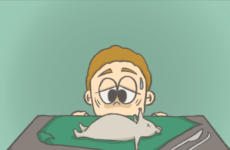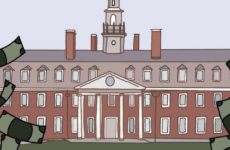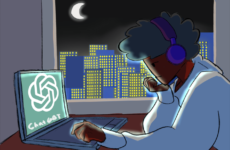Before a Cinderella-like dash to my dorm as the clock strikes midnight — although it’s a white Community Safety sedan rather than a horse-drawn carriage ferrying the heavy-eyed passenger — I lock the doors to the Newsroom: a forgotten room on the second floor of the Library, where it’s not uncommon to see a group of gung-ho teenagers scrambling to perfect even the most minute detail before we put our beloved paper to bed. It’s spring of 2017, and our editors and I have just finished the layout for our second issue as a masthead.
I, however, am not going to bed any sooner. Though The Choate News’s weekly layout night has ended, I have follow-up emails to draft, a St. John Hall special issue to plan, and — how can I forget — homework that I haven’t even started. When I sat at my desk that night with a seemingly endless list of tasks, I felt, for the first time in my life, like I’d lost a grip on myself.
As I adjusted to this new role as Editor-in-Chief of the paper, I spent almost every afternoon and night in the Newsroom assisting its production, muting everything else that was important to me. Finishing work in the wee hours of the morning became my new norm. I took six courses, including a Directed Study, so I got a six-course exemption. I peer-tutored in four subjects, which is something that I love doing, but it ate up my free blocks. When I did have free time, I usually chose to stay in my room and get ahead of work, often ordering fast food to be delivered. Translation: I was fully aware that I was deprived of sleep, exercise, and good nutrition. However, I was unaware of my mental state. The classes and activities that I relished most became almost unbearable. But I felt that I was doing what I had to do. Simply put, I made a critical mistake of holding myself to a superhuman standard.
It wasn’t until meeting Mr. Ford, my biology teacher, for extra help that I realized what I really needed wasn’t help on the class material, but on managing my life. Mr. Ford told me he knew that, too, but he was rather worried about how sustainable my workload was. After mulling over what he said throughout the day, I decided that I needed professional help. I walked into the counseling office without an appointment, and Mrs. Davidson took me in without question. I vented — not something I usually do, though it felt nice to have someone listening without passing judgement. She did not lecture or admonish me. Instead, she helped me process what I was putting myself through and reflect, for myself, what I should do in the coming weeks, an experience for which I’ll forever be grateful.
Later, I was fortunate enough to have a platform through which I could share this story. During New Student Orientation last fall, I and some other prefects worked with Health Services to hold a forum on student resources on campus. During the forum, I recounted this experience, and emphasized how students must not be ashamed to seek help.
I am writing today in a similar vein, particularly for juniors who will soon assume leadership post across campus.
Your academics, extracurriculars, and test scores — they’re important, I agree. But you must put both your mental and physical well-being above all else.
Obviously, you are more equipped to perform well when you are well-rested and engaging in some sort of physical activity. Lack thereof will result in a reciprocal decrease in energy and focus.
But I believe that there is a much greater problem on campus: an unsustainable mindset stemming from the belief that there is a transitory phase, the period from junior spring to senior winter, during which you must sacrifice everything. You might feel powerless, as if you are standing in front of a black hole that will suck life away from you, but you must not let it. You have the autonomy to prioritize and commit only to things that you believe are essential to your life.
Most importantly, know that it is not a sign of weakness to seek help when you realize you need it. Members of the community are always here to care for you.





